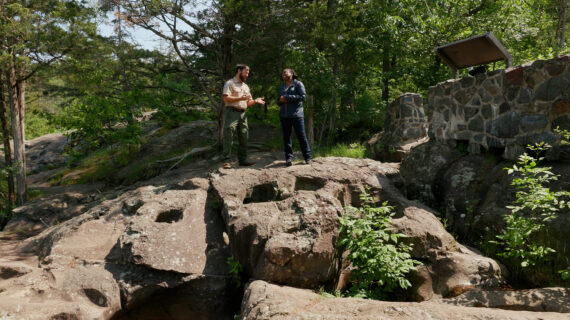Frederica Freyberg:
The Foxconn footprint is getting even bigger in Wisconsin. Today, the Taiwanese tech company announced it’s buying an office building in downtown Green Bay. The space will be used for an innovation center to develop applications for Foxconn’s 8K and 5G display technology. The company says it’s the first time these displays will be manufactured in the United States. The center is expected to employ about 200 people. The Foxconn ground-breaking Thursday brought news that the Mount Pleasant production plant may be scaled down from the version originally planned. The company, however, stands by its commitment to spend $10 billion building the plant and its promise to bring up to 13,000 jobs. The larger factory Foxconn says is planned for the future. But for now, products that use smaller glass screens will be manufactured instead of the original plan for larger display panels. None of that lessened President Trump’s enthusiasm and his Wisconsin welcome to the Taiwanese firm.
Donald Trump:
So even at this early stage, the economics benefits of this new plant are being felt in 60 of Wisconsin’s 72 counties already. Don’t worry. In another three weeks, it will be 72.
[applause]
Frederica Freyberg:
Meanwhile, the Democratic National Committee weighed in on the Foxconn launch saying, “Donald Trump and Scott Walker are both anti-worker and consistently put big corporations and the 1% ahead of hard-working families.” President Trump spoke just 4.5 miles from the nearest Harley-Davidson dealer, a symbol of the president’s contrasting week with corporations, new and old, in Wisconsin. Foxconn is coming as Harley-Davidson is going, taking some of its production overseas for its European buyers. According to a filing Harley-Davidson made with the Securities & Exchange Commission this week, the E.U.’s retaliatory tariffs imposed in response to the U.S. tariffs on steel and aluminum have increased from 6% to 31%. These tariffs, Harley says, will cost the motorcycle manufacturer approximately $2,200 per motorcycle exported from the U.S. to the E.U. The company estimates the annual impact due to the E.U. tariffs to be approximately $90 to $100 million. House Speaker Paul Ryan spoke out against the tariffs this week, even as President Trump defended them and admonished Harley for its overseas plans.
Donald Trump:
Harley-Davidson, please build those beautiful motorcycles in the USA, please, okay? Don’t get cute with us.
Paul Ryan:
I don’t think tariffs are the right way to go. I think tariffs are basically taxes. What ends up happening is you get escalating tariffs or escalating taxes. One of the reasons we did tax reform is to make it easier for businesses to keep manufacturing in America and exporting overseas.
Frederica Freyberg:
For more on tariffs and trade wars and Milwaukee’s own Harley-Davidson, we turn now to Edward Alden, senior fellow with the Council on Foreign Relations, who joins us by phone from Washington. Thanks very much for doing so.
Edward Alden:
It’s great to be with you. Thank you.
Frederica Freyberg:
President Trump was in Wisconsin late this week trumpeting the Asian company Foxconn breaking ground here and hosting a fundraiser in the city that built Harley-Davidson and yet the president’s “America First” trade policy is sending Harley overseas to make these motorcycles for the European market. Could Harley’s decision on this have been predicted?
Edward Alden:
Oh, I think it was easily predictable. The combination of the steel tariffs, which have raised input costs for Harley, and then of course the European retaliation made it not economical for the company to export from the United States to Europe. So I think that was very predictable. The president seemed somewhat surprised, but he shouldn’t have been.
Frederica Freyberg:
So if this is the reality and response from this iconic company, will others soon follow?
Edward Alden:
I think some others will have to do the same, though not every company has the sort of flexibility that Harley has. Harley has several production locations overseas. So it’s not that complicated for the company to shift production. I’m more worried about the smaller producers. There are a lot of little companies around the country that are complaining about rising costs of steel and aluminum. The price has essentially doubled since the tariffs were imposed. Those companies are facing higher costs. They do not have that kind of option. There’s a small nail producer in the United States that has cut jobs quite significantly. And actually you’re hearing in the oil patch in Texas and elsewhere, their costs for drilling equipment, other things are going up. That’s not particularly mobile. So not every country is going have– excuse me, not every company is going to have the sort of option that Harley-Davidson had here.
Frederica Freyberg:
And what about the U.S. steel industry? Is this helping that industry?
Edward Alden:
I mean, I think it will, yeah. You know, you’re seeing U.S. steel has opened a mill that it had idled because of lack of demand. You’ve seen the opening of a new aluminum rolling mill in Kentucky. The problem is the number of jobs in those industries pales against the number of jobs in the industries that use these materials. About 140,000 jobs across the country in steel and aluminum production. Hundreds of thousands more in steel-using companies of various sorts like Harley-Davidson. So there will be winners and losers, but I think it’s pretty clear that the losers are going to outnumber the winners here by a considerable margin.
Frederica Freyberg:
Does what’s shaping up, if it’s not already a global trade war, affect the larger global economy?
Edward Alden:
We will have to see. I mean, so far the numbers are pretty small, you know. You know, $10, $20 billion here, maybe $50 billion against China in the context of $18 trillion U.S. economy. Those numbers aren’t big. But if we get escalating retaliation, absolutely it could affect the global economy. You’ve actually seen markets soften a lot. I mean here in the United States the Dow is down sort of 10% on the year and international markets have taken a bigger hit. This is almost all the product of this trade uncertainty because generally U.S. economy is pretty strong and so are overseas economies. I think that could easily get worse.
Frederica Freyberg:
My other question other than the markets, what’s kind of the chamber of commerce response and reaction to this?
Edward Alden:
Well, this has been very interesting because of course, they’re upset about the trade policy. They don’t like the tariffs. They have been moderately vocal. But the companies were so happy as a result of the big corporate tax cut they got courtesy of the Republican Congress, signed by President Trump in December, they’re very happy with what the president is doing on deregulation. The economy is pretty strong right now. Normally you would have expected enormous hue and cry over this. Certainly if it had been a Democratic president doing this, chamber of commerce would have gone crazy. But they have been relatively muted so far. I think if this escalates, particularly if the Trump Administration puts tariffs on imported cars, I think that could change and the business community could become far more vocal than it has been so far.
Frederica Freyberg:
And yet could President Trump’s protectionist trade policy work in the end to the United States’ advantage?
Edward Alden:
Well, I mean, that’s not what history tends to show, right? It will — I mean, there’s some companies that will locate in the United States to try to get around the tariffs. But we will lose markets in all the fastest-growing economies in the world. And the last time we experimented with this sort of protectionism on a large scale was in the 1930s and it didn’t work out well then. So nobody can really read the future perfectly, but based on what we know from the past, this is likely to be very costly for the American economy and hurt a lot of other economies around the world, including our allies.
Frederica Freyberg:
Very briefly, would Foxconn be an example of a company that would locate in the United States to get around the tariffs?
Edward Alden:
Well, they’ve planned this for a long time, so they had intended to do it anyway. Though I think some of it was because of the rising concern in the United States over production being located in China. So I think some of that was politically motivated to try to take a little bit of pressure off of the company. I can imagine other companies making the same decision. They’re always in these trade disputes winners and losers and there will be places in the country I think that will see more new investment. That’ll be far outweighed I think by companies like Harley-Davidson that move production elsewhere. We’re about to get a real test of those theories.
Frederica Freyberg:
All right. Edward Alden, thanks very much.
Edward Alden:
Great to be with you. Thank you.
Search Episodes
Related Stories from PBS Wisconsin's Blog

Donate to sign up. Activate and sign in to Passport. It's that easy to help PBS Wisconsin serve your community through media that educates, inspires, and entertains.
Make your membership gift today
Only for new users: Activate Passport using your code or email address
Already a member?
Look up my account
Need some help? Go to FAQ or visit PBS Passport Help
Need help accessing PBS Wisconsin anywhere?

Online Access | Platform & Device Access | Cable or Satellite Access | Over-The-Air Access
Visit Access Guide
Need help accessing PBS Wisconsin anywhere?

Visit Our
Live TV Access Guide
Online AccessPlatform & Device Access
Cable or Satellite Access
Over-The-Air Access
Visit Access Guide
 Passport
Passport


















Follow Us